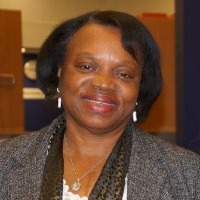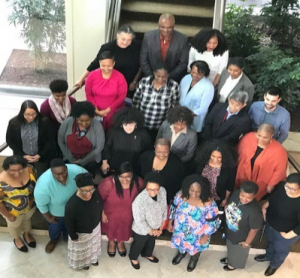
Mary Jo Fayoyin is Dean of Library Services at Savannah State University, and attended the 2017 DLF Forum as an HBCU Fellow. The award, which brought 24 fellows to the conference, was part of a collaborative effort with the HBCU Library Alliance, supported by a grant from IMLS.
As the dean of the library at Savannah State University I am always searching (and researching) ideas to increase the reach of the library with students and faculty; with alumni; and in the community. Our most successful outreach efforts have been a result of partnerships that we have developed with faculty members, student groups, the alumni, and with colleagues on other campuses. I attended the DLF Liberal Arts Colleges/HBCUs preconference e-conference session entitled “Partnerships That Have Worked” hoping to hear about innovative partnerships and how these successful collaborations were developed and sustained.Partnerships that Work
Although there was diversity in the institutions – small and large; HBCUs and PWIs; Ivy and non-Ivy—whose staff took part in the Sunday “Partnerships That Have Worked” discussion, there was commonality in our experiences. We have found that partnerships have to be nurtured and that the best partnerships are developed over time. Furthermore the most successful partnerships have been the result of first developing friendships with a person or group.
Librarians at Savannah State University are liaisons to an academic department or college. As librarian liaisons they are expected to demonstrate that they:
- Answer questions, resolve problems, interpret library policy, and provide information about library resources
- Provide workshops on research tools or on topics that are of special interest to faculty
- Work with faculty to develop high quality collections in their subject areas
- Provide reference assistance with faculty research
- Work with faculty to make information literacy an essential component of students’ learning
While librarians are ready and willing to provide these services, they can’t force faculty to partake. Is there a framework that we as librarians or archivists can use to increase engagement with faculty? Over time the librarians at Savannah State have empirical evidence that the single most important factor affecting success – i.e. having a significant number of faculty who contact them (the librarians) for services – was engagement with faculty beyond library/archival related activities. The most successful librarian liaisons are those who attend college or departmental meetings, lectures and programs. They volunteer as judges for various academic events and they serve as committee members for academic and student services initiatives thereby forging relationships with faculty and staff. They meet with their faculty for lunch, coffee, or drinks. Savannah State librarians were not alone; across the spectrum during this session my colleagues gave anecdotal evidence to support that this is a successful strategy for increasing engagement.
The question then is “How do we encourage librarians to engage with faculty? One “twist their arm” strategy is to make engagement a part of the annual evaluation checklist. Librarians should be allowed to develop their own form of measurable engagement. Beyond the previously mentioned ways of engaging with faculty, my librarians work with faculty to develop and submit grants and assist faculty in their research.
I recognize these as legitimate engagement activities. As a result of developing relationships with our faculty we have received grants, awards, and recognition on and off campus. Other libraries have benefited from partnerships. As a member of the HBCU Library Alliance, I am aware of many successful collaborations that my fellow HBCU librarians have engaged in.
- Jean Greene, director of the Hinds Community College Library (Utica, Mississippi), attended this session. Jean has worked with colleagues in her institution’s Humanities division to write a successful grant. Jean served as co-director with the NEH Grant Project, William H. Holtzclaw & the Black Man’s Burden. Jean also created the nine-panel traveling exhibit titled: The Utica Normal and Industrial Institute: The History, The Legacy, and The Promise for the project.
- The Atlanta University Center Woodruff Library, whose executive director was the keynote speaker for the pre-conference, collaborated with the African American Human Rights Foundation, Clark Atlanta University Department of Political Science, and Global South Research Consortium to host the symposium, “Justice Denied: People’s Power, The Struggle Continues.” The symposium explored issues of racism, discrimination, injustice and the general lack of equity in both the past and the present, by examining the ongoing fights for human rights and equal justice in Guyana in the 1970s and 1980s and in the U.S. today.
- The James B. Duke Memorial Library at Johnson C. Smith collaborated with Business faculty and the Charlotte Mecklenburg Library and received funding in the amount of $33,609.00 from the Library Services Technology Act (LSTA) to fund a new Library Entrepreneurial Research Hub.
Numerous pre-conference and conference sessions during this 2017 forum demonstrated that DLF see collaborations and partnerships as important. But DLF goes further than just hosting sessions on the topic. Its partnership with the HBCU Library Alliance demonstrates that the Digital Library Federation indeed “practices what it preaches!”

